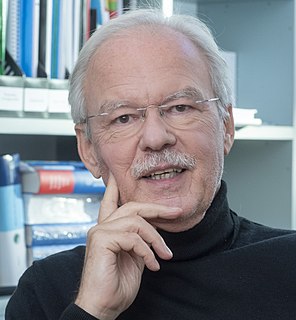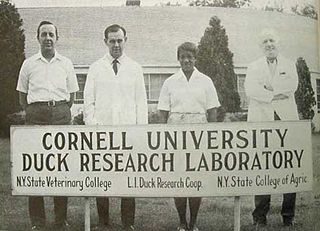Related Research Articles

The American Society for Microbiology (ASM), originally the Society of American Bacteriologists, is a professional organization for scientists who study viruses, bacteria, fungi, algae, and protozoa as well as other aspects of microbiology. It was founded in 1899. The Society publishes a variety of scientific journals, textbooks, and other educational materials related to microbiology and infectious diseases. ASM organizes annual meetings, as well as workshops and professional development opportunities for its members.

Stanley Alan Plotkin is an American physician who works as a consultant to vaccine manufacturers, such as Sanofi Pasteur, as well as biotechnology firms, non-profits and governments. In the 1960s, he played a pivotal role in discovery of a vaccine against rubella virus while working at Wistar Institute in Philadelphia. Plotkin was a member of Wistar’s active research faculty from 1960 to 1991. Today, in addition to his emeritus appointment at Wistar, he is emeritus professor of Pediatrics at the University of Pennsylvania. His book, Vaccines, is the standard reference on the subject. He is an editor with Clinical and Vaccine Immunology, which is published by the American Society for Microbiology in Washington, D.C.

Stanley "Stan" Falkow was an American microbiologist and a professor of microbiology at Georgetown University, University of Washington, and Stanford University School of Medicine. Falkow is known as the father of the field of molecular microbial pathogenesis. He formulated molecular Koch's postulates, which have guided the study of the microbial determinants of infectious diseases since the late 1980s. Falkow spent over 50 years uncovering molecular mechanisms of how bacteria cause disease and how to disarm them. Falkow also was one of the first scientists to investigate antimicrobial resistance, and presented his research extensively to scientific, government, and lay audiences explaining the spread of resistance from one organism to another, now known as horizontal gene transfer, and the implications of this phenomenon on our ability to combat infections in the future.
Ellen S. Vitetta is the director of the Cancer Immunobiology Center at the University of Texas Southwestern Medical Center in Dallas.

Peter Jay Hotez is an American scientist, pediatrician, and advocate in the fields of global health, vaccinology, and neglected tropical disease control. He serves as founding dean of the National School of Tropical Medicine, Professor of Pediatrics and Molecular Virology & Microbiology at Baylor College of Medicine, where he is also Director of the Texas Children's Hospital Center for Vaccine Development and Texas Children's Hospital Endowed Chair in Tropical Pediatrics, and University Professor of Biology at Baylor University. Hotez served previously as president of the American Society of Tropical Medicine and Hygiene and is a founding Editor-in-Chief of PLOS Neglected Tropical Diseases. He is also the co-director of Parasites Without Borders, a global nonprofit organization with a focus on those suffering from parasitic diseases in subtropical environments.

Stefan Hugo Ernst Kaufmann is a German immunologist and microbiologist and is one of the highly cited immunologists worldwide for the decade 1990 to 2000. He is amongst the 0.01% most cited scientists of ca. 7 million scientists in 22 major scientific fields globally.

Lucy Shapiro is an American developmental biologist. She is a professor of Developmental Biology at the Stanford University School of Medicine. She is the Ludwig Professor of Cancer Research and the director of the Beckman Center for Molecular and Genetic Medicine. She founded a new field in developmental biology, using microorganisms to examine fundamental questions in developmental biology. Her work has furthered understanding of the basis of stem cell function and the generation of biological diversity. Her ideas have revolutionized understanding of bacterial genetic networks and helped researchers to develop novel drugs to fight antibiotic resistance and emerging infectious diseases. In 2013, Shapiro was presented with the 2011 National Medal of Science. for "her pioneering discovery that the bacterial cell is controlled by an integrated genetic circuit functioning in time and space that serves as a systems engineering paradigm underlying cell differentiation and ultimately the generation of diversity in all organisms."
Firdausi Qadri is a Bangladeshi scientist with specialization in immunology and infectious disease research. She has worked over 25 years on the development of vaccines for cholera and has expertise on other infectious disease like ETEC, Typhoid, Helicobacter pylori, rotavirus, etc. Currently, she is working as a director for Centre for Vaccine Sciences of International Centre for Diarrhoeal Disease and Research, Bangladesh (icddr,b). She also serves as chairperson of the Institute for developing Science and Health initiatives. Her scientific achievements lie in enteric infections and vaccines including Vibrio cholerae and enterotoxigenic Escherichia coli—major causes of severe diarrhea. She has also focused on studying the immune response in H.pylori infected people in Bangladesh and the responses in patients with typhoid fever as well as vaccinees.
Irwin William Sherman was a biology professor emeritus. He taught at University of California, Riverside for 42 years and retired as executive vice chancellor. Sherman is known for his studies of malaria.
Akiko Iwasaki is the Waldemar Von Zedtwitz Professor in the Department of Immunobiology and a Professor in the Department of Molecular, Cellular, and Developmental Biology at Yale University. She is also a principal investigator at the Howard Hughes Medical Institute. Her research interests include innate immunity, autophagy, inflammasomes, sexually transmitted infections, herpes simplex virus, human papillomavirus, respiratory virus infections, influenza infection, T cell immunity, and commensal bacteria.
Arturo Casadevall is a Bloomberg Distinguished Professor of Molecular Microbiology & Immunology and Infectious Diseases at the Johns Hopkins Bloomberg School of Public Health and Johns Hopkins School of Medicine, and the Alfred and Jill Sommer Professor and Chair of the W. Harry Feinstone Department of Molecular Microbiology and Immunology at the Johns Hopkins Bloomberg School of Public Health. He is an internationally recognized expert in infectious disease research, with a focus on fungal and bacterial pathogenesis and basic immunology of antibody structure-function.

B. Brett Finlay, is a Canadian microbiologist well known for his contributions to understanding how microbes cause disease in people and developing new tools for fighting infections, as well as the role the microbiota plays in human health and disease. Science.ca describes him as one of the world's foremost experts on the molecular understanding of the ways bacteria infect their hosts. He also led the SARS Accelerated Vaccine Initiative (SAVI) and developed vaccines to SARS and a bovine vaccine to E. coli O157:H7. His current research interests focus on pathogenic E. coli and Salmonella pathogenicity, and the role of the microbiota in infections, asthma, and malnutrition. He is currently the UBC Peter Wall Distinguished Professor and a Professor in the Michael Smith Laboratories, Microbiology and Immunology, and Biochemistry and Molecular Biology, and Co-director and Senior Fellow for the CIFAR Humans and Microbes program. He is also co-author of the book Let Them Eat Dirt: Saving Your Child from an Oversanitized World and The Whole-Body Microbiome: How to Harness Microbes - Inside and Out - For Lifelong Health. Finlay is the author of over 500 publications in peer-reviewed journals and served as editor of several professional publications for many years.

Jessie Isabelle Price was a veterinary microbiologist. She isolated and reproduced the cause of the most common life-threatening disease in duck farming in the 1950s and developed vaccines for this and other avian diseases. A graduate of Cornell University, where she gained a PhD (1959), she worked first at the Cornell Duck Research Laboratory and later at the USGS National Wildlife Health Center. She served as chair of the Predoctoral Minority Fellowship Ad Hoc Review Committee of the American Society for Microbiology (ASM), and as president of Graduate Women in Science.
Beronda Montgomery is a writer, science communicator, and Michigan State University Foundation Professor in the Departments of Biochemistry & Molecular Biology and of Microbiology & Molecular Genetics. She is also a member of the MSU-DOE Plant Research Laboratory. Her research group investigates how photosynthetic organisms adapt to changes in their environment. Her scholarship extends beyond biology and into studying mentorship and faculty development to develop evidence-based strategies to foster equity and inclusion in academia. Together with Tanisha Williams and other members of the Black Botanists Week organizing committee, Montgomery co-founded and co-organizes Black Botanists Week.
Noel R. Rose, was an American immunologist, pathologist, and molecular microbiologist. He is widely known for pioneering autoimmunity during the 1950s and made several contributions to the field of autoimmunity, which brought in the modern era of research into autoimmune disease. He is often referred to as the "Father of Autoimmunity".
Reshma Kewalramani, is the president and chief executive officer of Vertex Pharmaceuticals, a biotechnology company based in Boston, Massachusetts, as of April 1, 2020. She is the first female CEO of a large US biotech company. She was previously the chief medical officer and vice president of global medicines development and medical affairs at Vertex.

Robin Patel is an American microbiologist and was the 2019–2020 president of the American Society for Microbiology. She is the Elizabeth P. and Robert E. Allen Professor of Individualized Medicine at the Mayo Clinic and director of the Mayo Clinic's Infectious Diseases Research Laboratory, where she studies biofilms, antimicrobial resistance, periprosthetic joint infection and diagnostic testing of bacteria.

Abigail A. Salyers was a microbiologist whose research focused on bacteria in the intestinal tract contributing to better understanding of antibiotic resistance and mobile genetic elements. She was awarded numerous teaching awards, an honorary degree from ETH Zurich and was a past president of the American Society for Microbiology.

Drew Weissman is an American physician-scientist best known for his contributions to RNA biology. His work helped enable development of effective mRNA vaccines, the best known of which are those for COVID-19 produced by BioNTech/Pfizer and Moderna. Weissman is a professor of medicine at the Perelman School of Medicine at the University of Pennsylvania (Penn). He and his research colleague Katalin Karikó have received numerous awards including the presigious Lasker-DeBakey Clinical Medical Research Award.
Millicent "Mimi" Edna Goldschmidt is an American microbiologist. Goldschmidt is known for her pioneering work in the field of astrobiology in addition to her medical research and her contributions to rapid testing methods for detecting microbial contaminants. Goldschmidt is a professor emerita at the University of Texas.
References
- 1 2 Yee, Karen. "LibGuides: Center for the History of Microbiology/ASM Archives (CHOMA): Reference Documents". lib.guides.umbc.edu. Retrieved 2020-07-16.
- 1 2 Many faces, many microbes : personal reflections in microbiology. Atlas, Ronald M., 1946-. Washington, D.C.: ASM Press. 2000. ISBN 1-55581-190-6. OCLC 43287411.
{{cite book}}: CS1 maint: others (link) - ↑ "Carol Nacy" . Retrieved July 16, 2020.
{{cite web}}: CS1 maint: url-status (link) - 1 2 3 Immunology 2010. "Nacy biography" (PDF). Archived (PDF) from the original on 2020-07-16. Retrieved July 16, 2020.
- 1 2 "Dr. Carol Nacy, CEO of Sequella, Takes on the Global Crisis of Anti-Microbial Resistance BioBuzz". BioBuzz. 2018-08-27. Retrieved 2020-07-16.
- ↑ "Sequella Overview". www.sequella.com. Retrieved 2020-07-16.
- ↑ "Society of Leukocyte Biology newsletter" (PDF). Archived (PDF) from the original on 2020-07-17. Retrieved July 16, 2020.
- ↑ "Women In Bio". Women In Bio. Retrieved 2020-07-16.
- ↑ "2009 Hope is a Vaccine Award Ceremony". Gaia Vaccine Foundation. Retrieved 2020-07-16.